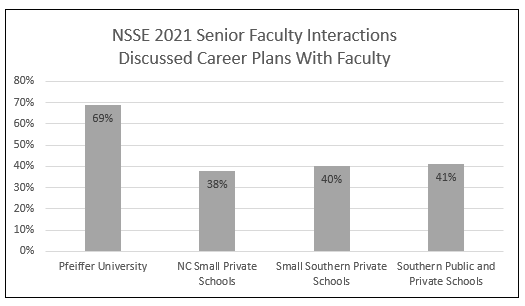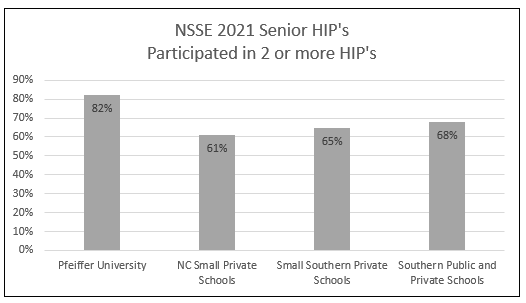
Survey Shows Pfeiffer Leading Peer Schools in Educational Value
By the time they graduate, Pfeiffer University’s undergraduate students are more likely than seniors at peer schools to have worked on a research project with a professor and to have discussed a course’s topics with a faculty member outside of class. They’re also more likely to have joined a Living-Learning Community, undertaken an internship, participated in a community-based project, or completed a capstone course.
These are just some of the findings of the 2021 National Survey of Student Engagement (NSSE), an annual study produced by doctoral education administration students at Indiana University. The next survey will feature input from students at 705 institutions — including such North Carolina schools as Pfeiffer, Catawba College, Elon University, High Point University, UNC Charlotte, and UNC Wilmington.
“Pfeiffer alumni often relay that out-of-class relationships with faculty, coaches and others on campus made an important difference in their learning experience,” said Dr. Scott Bullard, Pfeiffer’s President. “The NSSE findings support our belief that these important relationships still thrive, and that Pfeiffer students continue to be the beneficiaries of a high-touch, personal learning environment that supports the whole student.”
The 2021 survey asked freshmen and seniors questions about how they spent their time at the University and what they gained from attending it. The answers were compared with those of students at comparison institutions in North Carolina, the Southeast, and across the country.
The survey paints a positive picture of Pfeiffer’s small-is-beautiful culture, particularly in areas related to student engagement with faculty. Compared with seniors at all comparison institutions addressed in the survey, for example, Pfeiffer’s seniors were 32 percent more likely to have discussed their career plans with a professor and 29 percent more likely to have discussed a course’s material with faculty after class. Pfeiffer also did considerably better than its peer schools in generating student participation in high-impact practices (HIPs), which include service-learning, membership in a learning community, research with faculty, internships, study abroad, and a culminating senior experience.
Survey data indicates that in many instances, Pfeiffer compares favorably with schools in North Carolina and the South. For example, 69 percent of Pfeiffer’s seniors discussed their career plans with a professor in 2021. By contrast, a similar scenario played out among 38 percent of seniors in North Carolina’s small private schools, 40 percent of seniors in small private Southern schools, and 41 percent of seniors in Southern public and private schools.

Another example: 82 percent of Pfeiffer’s seniors participated in two or more HIPs in 2021. By contrast, 61 percent of seniors in North Carolina’s small private schools, 65 percent of seniors in small private Southern schools, and 68 percent of seniors in Southern public and private schools participated in these same activities.

Each NSSE survey provides material for an annual book called A Pocket Guide to Choosing a College. The most recent guide states that 89 percent of Pfeiffer’s seniors rated their “entire educational experience” as “excellent or good.” It suggests that the University values collaboration, with 78 percent of seniors having “frequently worked with their peers on course projects and assignments.”
The next NSSE will be sent out to Pfeiffer students on Feb. 28. Its results will not only tell Pfeiffer’s administration what the University is doing particularly well; they will also help determine the focus of the Quality Enhancement Plan (QEP), which the Southern Association of Colleges and Schools Commission on Colleges (SACS) requires of Pfeiffer and every other school it accredits. QEPs address issues that affect all students. The next one could, for example, look at improving the ways that online learning is delivered or academic writing is taught, said Julia Kennedy, Pfeiffer’s Director of Institutional Research.
Dr. Daniel Mynatt, Pfeiffer’s Provost and Vice President of Academic Affairs, believes the last NSSE survey shows that the University’s students are getting the best possible value for their education.
“It reinforces to parents and future employers that our students are getting not just a degree in a particular subject but a well-rounded experience that equips them especially well for the workforce,” he said.